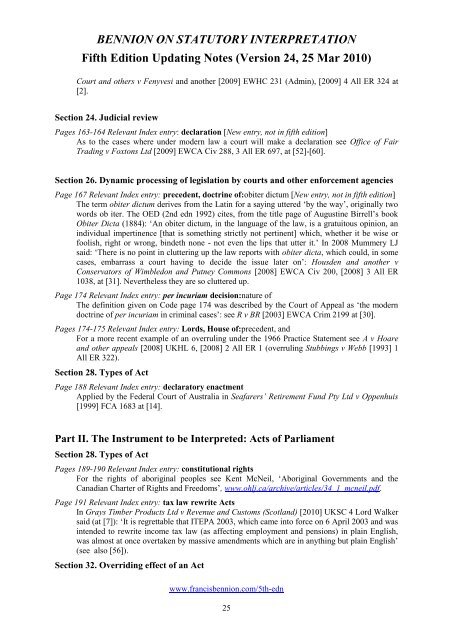BENNION ON STATUTORY INTERPRETATION ... - Francis Bennion
BENNION ON STATUTORY INTERPRETATION ... - Francis Bennion
BENNION ON STATUTORY INTERPRETATION ... - Francis Bennion
You also want an ePaper? Increase the reach of your titles
YUMPU automatically turns print PDFs into web optimized ePapers that Google loves.
<strong>BENNI<strong>ON</strong></strong> <strong>ON</strong> <strong>STATUTORY</strong> INTERPRETATI<strong>ON</strong><br />
Fifth Edition Updating Notes (Version 24, 25 Mar 2010)<br />
Court and others v Fenyvesi and another [2009] EWHC 231 (Admin), [2009] 4 All ER 324 at<br />
[2].<br />
Section 24. Judicial review<br />
Pages 163-164 Relevant Index entry: declaration [New entry, not in fifth edition]<br />
As to the cases where under modern law a court will make a declaration see Office of Fair<br />
Trading v Foxtons Ltd [2009] EWCA Civ 288, 3 All ER 697, at [52]-[60].<br />
Section 26. Dynamic processing of legislation by courts and other enforcement agencies<br />
Page 167 Relevant Index entry: precedent, doctrine of:obiter dictum [New entry, not in fifth edition]<br />
The term obiter dictum derives from the Latin for a saying uttered „by the way‟, originally two<br />
words ob iter. The OED (2nd edn 1992) cites, from the title page of Augustine Birrell‟s book<br />
Obiter Dicta (1884): „An obiter dictum, in the language of the law, is a gratuitous opinion, an<br />
individual impertinence [that is something strictly not pertinent] which, whether it be wise or<br />
foolish, right or wrong, bindeth none - not even the lips that utter it.‟ In 2008 Mummery LJ<br />
said: „There is no point in cluttering up the law reports with obiter dicta, which could, in some<br />
cases, embarrass a court having to decide the issue later on‟: Housden and another v<br />
Conservators of Wimbledon and Putney Commons [2008] EWCA Civ 200, [2008] 3 All ER<br />
1038, at [31]. Nevertheless they are so cluttered up.<br />
Page 174 Relevant Index entry: per incuriam decision:nature of<br />
The definition given on Code page 174 was described by the Court of Appeal as „the modern<br />
doctrine of per incuriam in criminal cases‟: see R v BR [2003] EWCA Crim 2199 at [30].<br />
Pages 174-175 Relevant Index entry: Lords, House of:precedent, and<br />
For a more recent example of an overruling under the 1966 Practice Statement see A v Hoare<br />
and other appeals [2008] UKHL 6, [2008] 2 All ER 1 (overruling Stubbings v Webb [1993] 1<br />
All ER 322).<br />
Section 28. Types of Act<br />
Page 188 Relevant Index entry: declaratory enactment<br />
Applied by the Federal Court of Australia in Seafarers’ Retirement Fund Pty Ltd v Oppenhuis<br />
[1999] FCA 1683 at [14].<br />
Part II. The Instrument to be Interpreted: Acts of Parliament<br />
Section 28. Types of Act<br />
Pages 189-190 Relevant Index entry: constitutional rights<br />
For the rights of aboriginal peoples see Kent McNeil, „Aboriginal Governments and the<br />
Canadian Charter of Rights and Freedoms‟, www.ohlj.ca/archive/articles/34_1_mcneil.pdf.<br />
Page 191 Relevant Index entry: tax law rewrite Acts<br />
In Grays Timber Products Ltd v Revenue and Customs (Scotland) [2010] UKSC 4 Lord Walker<br />
said (at [7]): „It is regrettable that ITEPA 2003, which came into force on 6 April 2003 and was<br />
intended to rewrite income tax law (as affecting employment and pensions) in plain English,<br />
was almost at once overtaken by massive amendments which are in anything but plain English‟<br />
(see also [56]).<br />
Section 32. Overriding effect of an Act<br />
www.francisbennion.com/5th-edn<br />
25

















